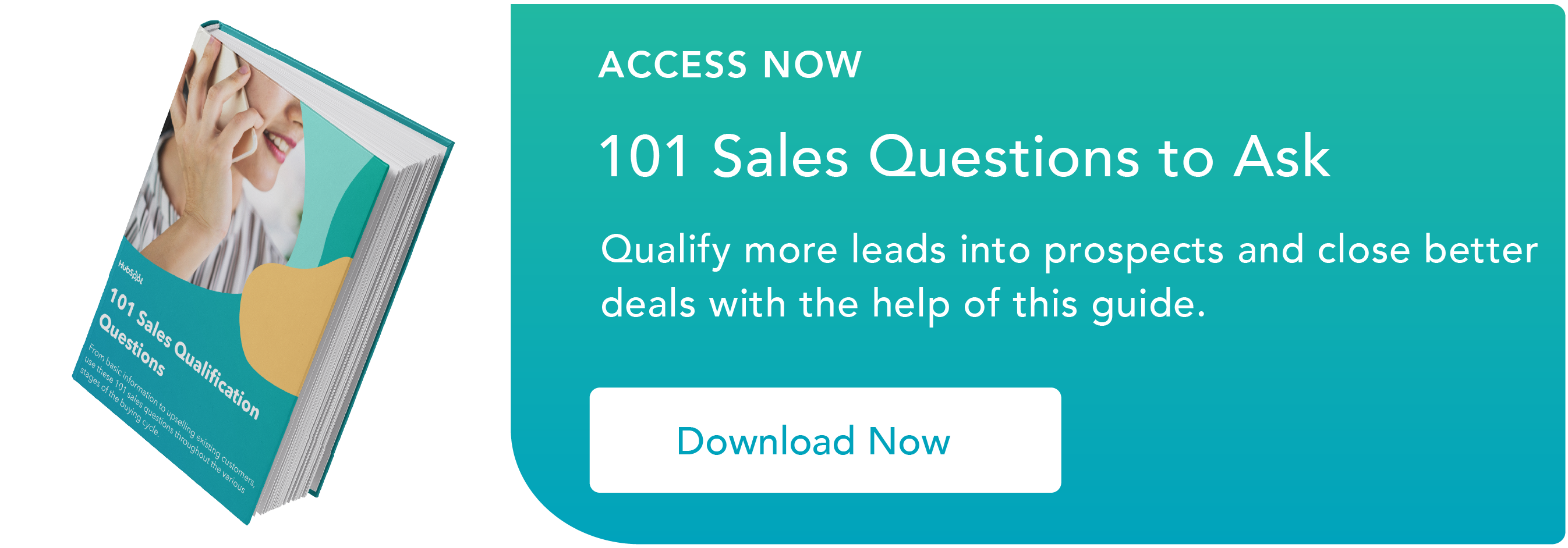Qualification is a critical sales activity that ensures reps aren’t wasting their time on leads that will never buy. It's a useful (or even essential) exercise to conduct at the start of your sales process — but there are certain limits to it.

Qualifying too much, too early can be counterintuitive. If you over-qualify up front, you might wind up narrowing your perspective to the point of missing viable opportunities and working on bad leads. In my opinion, it's always better to under-qualify leads initially and then over-qualify prospects during the first conversation — but reps often struggle with that.
So to help you qualify as effectively as possible and avoid some key missteps that will trip you up early on in your sales process, I've put together a list of four key prospect qualification mistakes to remain mindful of.
4 Key Prospect Qualification Mistakes
1. Fixating on Titles
Salespeople tend to make assumptions about a contact's type of work and decision-making authority based on their title — but titles can be deceiving. For instance, if a rep sells supply chain management software, they might assume that the head of operations is the relevant decision-maker.
In turn, they infer that people in other roles — like the facilities manager or a finance specialist — are unqualified prospects. They lock in on one title and let everyone else at the company fall by the wayside.
Something similar happens with inbound leads — reps are often slow to reach out to them (if they reach out at all) because they don't have the exact job title they're looking for.
But there’s just one problem — not everyone with the same title has the same responsibilities. The head of operations might control supply chain software choices at one company, but the facilities manager might have that kind of authority at another.They might even work in tandem or as part of a larger team.
All this to say, There's no one-size-fits-all model for what role makes decisions at every business — so you can't count on titles to be the be all, end all indicator of where to focus your energy.
2. Misunderstanding Needs
Let's say you sell software that keeps websites from crashing. Think about the companies you would target — your gut might tell you that you should focus on businesses whose websites crash regularly. Obviously, they have a pressing need that your product is essentially designed to solve. Seems like a no brainer, right?
Not quite. If you lock in on those companies exclusively, you're missing out on an entirely different type of prospect. Sure, businesses with unreliable websites have a more straightforward need for your product — but organizations with websites that perform well could use it too.
Those businesses have a preventative need for your software. They need something to get ahead of potential crashes — an extremely urgent pain point that you can tailor productive sales conversations around.
Leadership at one of those companies might have some big ideas for growing the website, but they're held back by inadequate crash protection. They would be receptive to a call from you, but their phones just aren't ringing because you are thinking too linearly.
When identifying needs, don’t use tunnel vision. Think about every likely scenario that would compel a prospect to buy your product. Don’t be too quick to disqualify a prospect for having the "wrong" problem — you could still provide the right solution.
3. Obsessing Over Budget
I would argue that B2B budget qualification is almost irrelevant. Unless the company you’re selling to is going out of business, it has money. The funds might not be earmarked for a specific project, but it’s there.
What’s far more important than knowing if they have the perfect budget is knowing if they have the ability to buy. For example, if you’re selling consulting services to an organization that has never hired a consultant in its history, you have to sell on two fronts.
First, you have to convince them that using a consultant at all is a good idea. Then once the baseline value is established, you have to convince the prospect that your consultancy is the best on the market. Getting through both of these stages is tough.
Selling consulting to a company that has bought these types of services before is much easier. This prospect is much more able to buy than the other opportunity, even if they both have the exact same funds.
Knowing a prospect’s buying history is far more informative for qualification than knowing their budget. Seek this information instead of a specific dollar amount.
4. Too Many Criteria
Lead scoring is a double-edged sword. What it offers in terms of accuracy often comes at the expense of time, and in my opinion, speed always trumps criteria. The time spent scrubbing a lead and evaluating it on several different points lengthens the span between when a salesperson receives a lead and when they make initial contact — stretching it from hours to days.
The longer you wait to contact the prospect, the less likely you'll be the first seller on the scene — that means losing out on some crucial benefits. Plus, the time you allot to over-qualification cuts into the time you have available to close.
Specificity is not necessarily a bad thing, but it can't be your only priority while qualifying. You can't get too caught up in ensuring that every lead is vetted as rigorously as a presidential candidate.
The bottom line is that more salespeople and leaders should get comfortable with under-qualifying early and over-qualifying later on. Casting a wider net won’t necessarily result in more chaff — it could also help you reel in more customers.
![Free Download: 101 Sales Qualification Questions [Access Now]](https://no-cache.hubspot.com/cta/default/53/e97d6603-b40e-4085-ad55-0074b7351ead.png)


![22 Best Sales Strategies, Plans, & Initiatives for Success [Templates]](https://blog.hubspot.com/hubfs/Best-Sales-Strategies-1.png)

![7 Social Selling Trends to Leverage This Year [New Data]](https://blog.hubspot.com/hubfs/social%20selling%20trends.png)
![How Do Buyers Prefer to Interact With Sales Reps? [New Data]](https://blog.hubspot.com/hubfs/person%20phone%20or%20online%20sales%20FI.png)
![7 Sales Tips You Need to Know For 2024 [Expert Insights]](https://blog.hubspot.com/hubfs/Sales%20Tips%202024%20FI.png)


![10 Key Sales Challenges for 2024 [+How You Can Overcome Them]](https://blog.hubspot.com/hubfs/sales%20challenges%20FI.png)
![The Top Sales Trends of 2024 & How To Leverage Them [New Data + Expert Tips]](https://blog.hubspot.com/hubfs/sales-trends-2023.png)